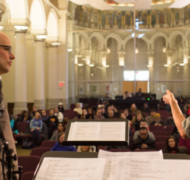Week 3: Invite Jesus into Your Every Crunch Time
Small Group Study / Produced by partner of TOW
Week 3 demonstrates how to bring a guest speaker into an integrated sermon and small group series. Val Snekvik, a guest speaker in this series, gave a sermon on her own life experience, using the book of Ruth as a model. The small group discussion questions were prepared afterwards.
Invite Jesus into Your Every Crunch Time (Audio)
Back to Table of Contents Back to Table of ContentsThis is the third sermon in the series: “Inspired: The Whole of Life with God in the Picture.” It was delivered by Val Snekvik at Reservoir Church Cambridge Massachusetts on September 27, 2015. This content is part of the Ruth and Parables curriculum, an 11-week integrated sermon and small group series on faith and work.

Ruth and Parables: Small Group Leaders Guide Week 3
Back to Table of Contents Back to Table of ContentsThis content is part of the Ruth and Parables curriculum, an 11-week integrated sermon and small group series on faith and work.
Note to small group leaders: This week we offer two options for small groups. Option one is the familiar set of questions reflecting on the readings in light of the sermon and the group members’ own lives. Option two is to try something that Val mentioned in the sermon, called “Lectio Divina.” There probably won’t be time to do both options in one group meeting.
Option One – Discussion Questions
Read Ruth 1:19-22
Question 1
Look at verse 20 “Don’t call me Naomi….Instead call me Mara.” The name Naomi means “pleasant.” Mara means “bitter.” Half the book of Psalms is full of complaints and laments similar to Naomi’s, but many Christians feel uncomfortable acknowledging negative feelings about God or to God. They think we need to be always positive.
- Should we be worried that Naomi is putting herself in an ever worse spot by identifying so strongly with her bad circumstances. Or should we admire Naomi’s honesty and her willingness to get real with God?
- How easy or hard do you find it to be honest about your feelings for God (or to God)? Is the answer different depending on whether the feelings are positive or negative?
- What word or words would you use to describe the place or emotional space you find yourself in your walk with God at the moment?
Question 2
Although Naomi feels caught in the midst of a bitter experience, she does more than just sit down and dwell on it. She gets up and goes on a journey back to Bethlehem, her home town. She also takes Ruth with her.
Sometimes in the midst of very difficult circumstances we feel stuck and find it hard to get moving.
- If you have ever found yourself in circumstances like this, what helped to sustain you and get you moving?
- What have you learned from these circumstances that you would want to pass on to others?
Question 3
Val told the story from Jesus (Luke 11:24-28) about the person delivered of an evil spirit who subsequently found themselves besieged by 8 spirits and worse off than before. If you have experienced God’s power as the breaking of an addiction or a destructive pattern of life, there’s the possibility of spending all your energy simply trying not to fall back into it. You can end up putting everything you have into keeping yourself “swept and in order.” Ironically, this may end focusing your life even more on the addiction or pattern, like the eight evil spirits who re-occupy the person. This is not new life or freedom, but self-enforced emptiness.
The solution, verse 28 suggests, is to open yourself to God’s word for your life now, to find the new patterns of life that God wants to fill your emptiness with, and then take steps to put them into practice.
- What are some life-giving ways of filling the emptiness you have found important?
- Val said that “religion, especially Christian religion, can train us to keep our house neat,” and that this usually ends up with us judging ourselves and perhaps others as well. What is your experience in this regard?
- Respond by saying what you think about one or more of Val’s four suggestions:
- Go face to face with God and be honest about what you are thinking and feeling.
- Meditate on the happy endings that God seems to love writing.
- Lean towards agrarian time (see Leviticus 19:23-25) rather than internet time as you wait for results.
- Make markers everywhere that remind you of God showing up.
Option two – Lectio Divina
- Ask a group member to read Ruth 1:19-22 aloud for the group. Then take 3 minutes in silence for meditatio. Allow yourself to be drawn to a word or phrase. Don’t try to analyze the whole passage, but just be drawn to that one word or phrase. What does it mean to you as God is giving it to you right now?
- Someone else read the passage again for the group out loud. Then take 3 minutes in silence for oratio. Repeat the word or phrase over and over in your mind. Just repeat it, don’t analyze it. Share the response of your heart with God.
- A third person read the passage again for the group out loud. Then take 3 minutes in silence for contemplatio. Quietly rest in God’s presence. Let the silence flow over the words and feelings from the meditatio and oratio, and let your mind, heart, and spirit be quiet and empty. If you get distracted, go back repeat the word or phrase again until your mind is quiet. Then silently rest in God’s presence again.
Afterwards, share among one another what word or phrase you were drawn to and how your heart responded to God in it.









